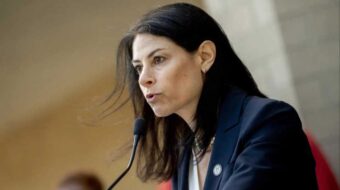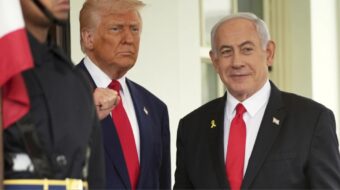India: Unprecedented women’s bill passes hurdle
After two days of intense debate, India’s upper house overwhelmingly approved legislation on March 9 requiring women occupy one third of national assembly and state legislative seats. With that vote, the measure passed a significant hurdle on it way to becoming law, the first of its kind in the world. The Women’s Reservation Bill had been stalled until the recent upper house action.
However, two regional parties threatened to derail future ruling-Congress Party legislation if the lower house follows suit. Detractors saw the reform as benefitting privileged women at the expense of Islamic and lower caste voters.
Women make up only 8 to 13 percent of all elected officials in India.
In 1991, the Communist-led government of Kerala introduced a 30 percent quota for women serving in the district legislature. In 1996, Geeta Mukherjee, a member of the Communist Party of India-Marxist, chaired a joint parliamentary committee which submitted a report to the two houses recommending the “reservation” of one third of seats for women. Both CPI-M and the Communist Party of India are supporters of the measure.
France: Sarkozy loses in regional elections
In regional elections, March 14, President Nicolas Sarkozy’s center right party secured 26 percent of the votes. The Socialist Party took almost 30 percent, and run-off elections March 21 will decide between the two. The Green Europe Ecologie party took third place with 13 percent of the votes followed by the right wing National Front Party at 12 percent. A record high 52 percent of voters abstained. The left coalition that included the French Communists won 6.2 percent of the votes. Regional election results made unaccustomed news this year as a forecast of possible presidential election results in 2012. Sarkozy’s unpopular labor and pension reform proposals plus 10 percent unemployment and significant deficit spending worked against him, reported EUobserver.com.
Paraguay: President honors Communist leader
“Forgive us, Ananías, for so much death, so much injustice,” asked President Fernando Lugo, who in ceremonies on March 10 awarded Paraguay’s highest civilian award, the National Order of Merit, to Ananías Maidana. With government officials and left activists looking on, Lugo honored the former secretary general of Paraguay’s Communist Party: “Comrade Maidana dedicated his entire life to Paraguayan democracy and for that he suffered persecution, torture, and jails during the Alfredo Stroessner dictatorship.” The President, quoted by pcv-venezuela.org, noted that “his party and its circumstances reflected limitless belief, unparalleled in our history, that struggle against oppression and for human dignity must be considered in terms of one’s own existence and its price.”
Palestine: Iron fist accompanies Israel’s land grab
On March 12, Israeli security forces sealed off the Al-Aqsa mosque, Islam’s third holiest shrine, to all but women and older men. Soldiers blocked thousands of Palestinians from entering East Jerusalem. Clashes with protesters left 20 wounded. The West Bank remained closed as of March 15, except for humanitarian workers and commerce. The turmoil coincided with announcements that 1,600 new Israeli housing units were going up soon in East Jerusalem and 50,000 more within a few years. Prime Minister Benjamin Netanyahu apologized to the visiting U.S. Vice President Joe Biden for the timing of the announcement, which is widely seen as an affront to the Obama administration who opposes new settlements. South of Bethlehem, Palestinians received land confiscation notices, reported Ma’an news. Meanwhile, settlers burned a six acre Palestinian-owned olive grove north of Hebron. The Palestinian Authority called off peace talks.
Photo: CPI member holds a poster in favor of a mandatory one-third women’s representation in parliament and state bodies, Hyderabad, India, March 2008. Teresa Albano/PW











